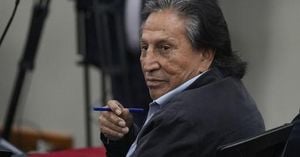The latest clash between the Trump administration and the mainstream media erupted over the Labor Day weekend, as Homeland Security Secretary Kristi Noem accused CBS News of "shamefully" editing her remarks about Kilmar Abrego Garcia—a Salvadoran immigrant at the center of a heated political and legal battle. The controversy, which has drawn in top government officials and reignited debates over media ethics, government transparency, and immigration policy, underscores the deep divisions over how public figures and news organizations handle contentious allegations in an era of polarized politics.
On August 31, 2025, Secretary Noem appeared on CBS’s flagship Sunday program, Face the Nation, then guest-hosted by Ed O’Keefe. The interview focused on the Trump administration’s efforts to deport Abrego Garcia, whom Noem described in stark and damning terms. According to a transcript Noem later released, she called Abrego Garcia “a known human smuggler, MS-13 gang member, an individual who’s a wife beater, and someone who was so perverted that he solicited nude photos from minors.” She continued, “So he needs to never be in the United States of America, and our administration is making sure we’re doing all that we can to bring him to justice.”
However, when the segment aired, viewers saw a trimmed version. CBS explained that the cut—nearly four minutes, or more than 23% of the 16 minute and 40 second interview—was a standard edit for time constraints. The network insisted it met all editorial standards, pointing out that the entire interview and full transcript were posted online for public viewing. “Secretary Noem’s ‘Face The Nation’ interview was edited for time and met all CBS News standards. The entire interview is publicly available on YouTube, and the full transcript was posted earlier this morning on CBSNews.com,” a CBS spokesperson told Fox News Digital on September 2, 2025.
Noem was unmoved by the explanation. She took to social media, posting video clips and writing, “I joined CBS to report the facts about Kilmar Abrego Garcia. Instead, CBS shamefully edited the interview to whitewash the truth about this MS-13 gang member and the threat he poses to American public safety.” The Department of Homeland Security backed her up, releasing a statement that CBS had cut important parts of her answer “exposing the truth about criminal illegal alien Kilmar Abrego Garcia.”
Acting ICE Director Todd Lyons joined the fray, appearing on America’s Newsroom to echo Noem’s complaints. “It is very disheartening the fact they want to go ahead and stop Secretary Noem from telling the truth about this egregious offender… No one’s going to read a transcript. No one’s going to go to YouTube. You had millions of viewers at that time on the Sunday morning show watching that and have key parts of that conversation cut out. It’s not right,” Lyons said, according to Fox News. He emphasized the Trump administration’s commitment to transparency and public safety, stating, “In the interview, she talked about this offender and why he needs to be deported back to his country. I think it’s a shame they would go ahead and edit that because this person isn’t a ‘Maryland man.’ He is a criminal alien from El Salvador that’s living in Maryland that we need to take off the streets.”
The case of Kilmar Abrego Garcia is as legally complex as it is politically charged. While Noem and other officials have repeatedly described him as a dangerous gang member and predator, the facts of the case are far from clear-cut. According to Politifact and reporting by The New York Sun, the Trump administration has not produced conclusive evidence tying Abrego Garcia to MS-13, despite an extensive multi-agency investigation. A judge in July noted that the government had made “poor attempts to tie Abrego to MS-13,” and that the court “would have to make so many inferences” to reach that conclusion that it “would border on fanciful.”
On the criminal front, Abrego Garcia faces federal charges of conspiracy to transport and unlawfully transport undocumented people, to which he has pleaded not guilty. The “wife beater” label stems from protective orders filed by his wife, Jennifer Vasquez Sura, in 2020 and 2021, alleging physical abuse. While a court did order Garcia not to contact or harass his wife, one of the protective orders was rescinded days after being filed, complicating the narrative. The most incendiary claim—that he solicited nude photos from minors—remains under investigation but is not part of the current indictment, as confirmed by Politifact and government filings.
Further muddying the waters, Abrego Garcia’s lawyers have accused the administration of trying to coerce a guilty plea by threatening deportation to Uganda, a country with which he has no ties. A senior prosecutor in Tennessee resigned over concerns about the strength of the government’s case, according to multiple reports. Meanwhile, Abrego Garcia’s supporters, including Senator Chris Van Hollen, have painted him as a victim of overzealous prosecution and politicized immigration enforcement.
The editing controversy comes at a sensitive moment for CBS News. Just two months ago, the network settled a $16 million lawsuit with Donald Trump, who had alleged deceptive editing of an interview with then-Vice President Kamala Harris during the 2024 campaign. The settlement, which included commitments to release full transcripts of pre-recorded political interviews, was seen by some as a move to smooth the approval process for Paramount Global’s merger with Skydance Media. Yet, as The New York Sun points out, the settlement hasn’t stopped Trump officials from making similar accusations—if anything, it may have emboldened them.
Media watchdogs and press freedom advocates are now debating the appropriate balance between editorial discretion and transparency. CBS’s decision to post the full interview online is standard practice, but critics argue that what airs on television reaches a much broader audience. “No one’s going to read a transcript. No one’s going to go to YouTube,” as Lyons put it. Others counter that networks are under no obligation to broadcast unproven or potentially defamatory statements, especially when legal proceedings are ongoing.
For CBS, the episode is another reminder of the pitfalls of covering polarizing political figures in a hyper-partisan environment. The network’s commitment to objectivity and transparency will likely be scrutinized for some time. For the Trump administration and its allies, the incident is further ammunition in their ongoing campaign to portray mainstream media as biased and untrustworthy.
As the legal and political battles over Kilmar Abrego Garcia continue to unfold, the fight over how his story is told—and who gets to tell it—shows no sign of abating.






